In this lesson, students practise reading for gist in the context of Thanksgiving — Day to Give Thanks. They are also going to have speaking practice.
Age: 13+
Level: Intermediate+
Time: 50 mins
Lesson type: Reading and Speaking
Number of students: 3-8
Table of contents:
- Activity 1. Lead-in
- Activity 2. Reading an article
- Activity 3. Speaking
- Activity 4. Thanksgiving snowball
Activity 1. Lead-in
Complete this mind map with as many words connected to Thanksgiving as you can.
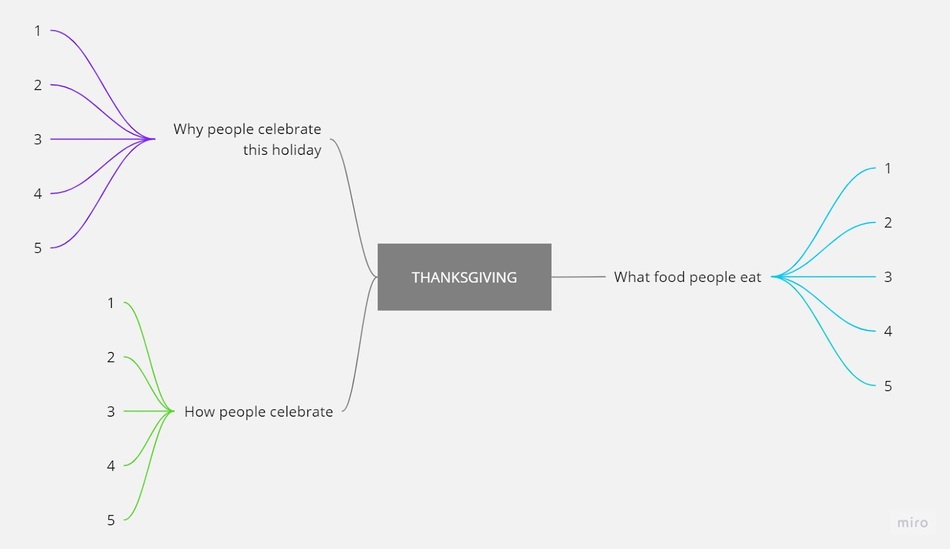
Lead-in 5 mins
Aims: to activate SS’ schemata.
Procedure: set the task and give SS some time to think over. Draw a mind map on the board (or you can use a mind map template in the worksheet) and elicit as many words as possible.
Activity 2. Reading an article
Work in mini groups.
Partner A: read the text about “The history of Thanksgiving”
Partner B: read the text “How do you celebrate Thanksgiving”
Partner C: read the text “What’s for dinner?”
Then tell your partners the most interesting facts that you’ve found out about Thanksgiving.
While there is not complete historical consensus on when or where America’s first Thanksgiving meal took place, the holiday celebration is most commonly cited to have originated in 1621 in what is now Plymouth, Massachusetts.
The story goes that after the Mayflower’s arrival at Plymouth Rock on December 11th, 1620, the Pilgrims (British separatists) lost 46 of their original 102 colonists. But, with the help of the Wampanoag Indians, they learned to care for their crops and survive the cold of their first winter in the New World. The summer of 1621 yielded a bountiful harvest. To celebrate, a traditional English (or potentially Native American) three-day harvest festival was organized to commemorate the magnanimous event.
While there are different historical accounts of the number of natives and pilgrims who actually attended the celebration, the sentiment is that the settlers wanted to show their gratitude to the natives for their help by hosting a large feast. Given the long and bloody history of conflict between Native Americans and European settlers, there is natural tension behind the validity of this claim.
Let’s fast forward a few centuries to modern-day Thanksgiving. Here’s a Thanksgiving day timeline:
9-10:00 am | Watch the Macy’s Thanksgiving Parade
Turn on the live stream or find your spot on the street as you watch giant helium balloons, floats, and marching bands parade through the streets of New York City.
10:00 am — 12:00pm | Go to the store
Thanksgiving, like most holidays in the US, is either a day off or a short day for employees. Luckily, grocery stores are usually open for the first half of the day, so make sure you get to the store early to pick up all the ingredients you’ll need to start cooking.
12-1:00 pm | Watch the presidential turkey pardon
Yep, you read that right, beginning in the mid-20th century, the President of the United States has “pardoned” one or two Thanksgiving turkeys each year, sparing the birds from slaughter.
All day | Watch American football
Thanksgiving day football games are an essential part of the American Thanksgiving experience. It is a great chance to cheer for your favorite team and a good distraction from the fact that you’re probably not eating lunch. After all, you’re going to need to be HUNGRY once dinner time rolls around.
All day | Cook, cook, cook
Preparing a proper Thanksgiving meal can take hours, sometimes even days, depending on what dishes you’re preparing and how many people you’re serving. Just the turkey alone takes at least 20 minutes for every pound, adding up to nearly five hours in the oven for the biggest birds.
6-10:00 pm | Eat more than you thought was humanly possible
It’s probably not surprising that there’s an American holiday based solely around eating, but it might be surprising how much eating you can actually do if you put your mind to it.
Turkey
For most non-vegetarian households, the turkey takes front and center at the Thanksgiving feast. Whether it’s roasted, smoked, brined, or fried, achieving that perfect blend of crackled outer skin and moist inner meat is an art.
Stuffing
Before you even put the turkey in the oven, you have to stuff it with cornbread, onions, celery, and dried cranberries. After hours cooking in the cavity of the turkey, the “stuffing” comes out delightfully moist and meaty with sweet undertones.
Cranberry sauce
Tart and sweet, cranberry sauce acts like Indian chutney to bring out the savory, juicy flavor of the turkey. Avoid the canned variety with this easy recipe from our Thanksgiving for beginners guide.
Gravy
Once you’ve removed the turkey from the oven, it’s gravy time. Made from the drippings on the bottom of the pan, turkey gravy is a meaty sauce that can be applied liberally across nearly every part of the Thanksgiving meal.
Mashed potatoes
Where else would you put that gravy? Smothered in the meaty gravy sauce, mashed potatoes are maybe the most delicious (and filling) dish on the Thanksgiving dinner menu.
Pumpkin pie
Seasonal, sweet, and satisfying, homemade pumpkin pie is the quintessential Thanksgiving dessert. But after going back for seconds or even thirds of turkey and ‘taters, it may be the most difficult dish for you to finish. But don’t worry! If you don’t finish on the night of, there’s always breakfast on Friday.
Speaking of leftovers, the Thanksgiving feast doesn’t end on Thursday night. With so much food, you’ll be eating turkey sandwiches, burritos, and casseroles for the rest of the weekend.
Source: How to celebrate Thanksgiving — Our complete guide
Work together. Look at the highlighted words in the text and guess their meaning. Talk about a similar holiday in your country using some of the highlighted expressions.
Reading an article 20 mins
Aims: to practise reading for gist.
Procedure: put the students in the groups of three. If you have less students, you can skip Text A about the history of Thanksgiving. Each student reads their own part and chooses 4-5 interesting facts. Help SS with unfamiliar words.Then they share the information with their partners. Ask them to use their own words without reading. In weaker classes ask SS to make notes before talking. Conduct a content feedback and ask each learner of the group to share the most interesting fact about Thanksgiving.
After that three students work together and try to work out the meaning of the highlighted words. Check understanding of the words by asking CCQs. Then SS use them in the description of any similar holiday in their country.
Read as well:
Activity 3. Speaking
True or false? Do a quiz with your partner. Which pair can give more correct answers?
Fast Facts
- Canadians celebrate their own Thanksgiving every November.
- Abraham Lincoln declared a national day of Thanksgiving in 1863.
- The first Macy’s Thanksgiving Day Parade was held in 1824.
- Around 16 million turkeys were eaten in the US on Thanksgiving in 2010. That’s around one fifth of all the turkeys eaten for the entire year.
- Benjamin Franklin wanted the turkey to be the national bird instead of the bald eagle.
- Around 88 percent of Americans eat turkey on Thanksgiving.
- The day before Thanksgiving is called Black Friday. It is the biggest shopping day of the year.
- A more recent Thanksgiving tradition is the U.S. President killing a turkey in public.
Speaking 10 mins
Aims: to practise speaking for fluency and engage SS by organizing a competition.
Procedure: SS discuss in pairs if the statements are true or false. They can write their answers on pieces of paper and hand it in to the teacher. The teacher decides who has the most correct answers and announces the winner.
Fast Facts
1. Canadians celebrate their own Thanksgiving every November. F (On the second Monday of October)
2. Abraham Lincoln declared a national day of Thanksgiving in 1863. T
3. The first Macy’s Thanksgiving Day Parade was held in 1824. F (1924)
4. Around 16 million turkeys were eaten in the US on Thanksgiving in 2010. That’s around one fifth of all the turkeys eaten for the entire year. F (Around 46 million turkeys)
5. Benjamin Franklin wanted the turkey to be the national bird instead of the bald eagle. T
6. Around 88 percent of Americans eat turkey on Thanksgiving. T
7. The day before Thanksgiving is called Black Friday. It is the biggest shopping day of the year. F (After)
8. A more recent Thanksgiving tradition is the U.S. President killing a turkey in public. F (The U.S. President pardoning a turkey — or saving it from being killed).
Activity 4. Thanksgiving snowball
Play Thanksgiving snowball fight.
Write two things you are thankful for on two strips of paper, make balls from paper and start throwing them. Then the teacher says, start collecting as many as you can. Talk to other students and find out “the author” of these notes.
Thanksgiving snowball 10 mins
Aims: to organize free speaking practice in the engaging context.
Procedure: hand out two strips of paper to each student. They write two things they are thankful for in their life. After that SS make balls from paper. Give a command to start a snowball fight. Let the snowball fight last for a minute or two. After that SS should collect as many paper balls as possible from the floor. This is a mingle activity. They have to find “the author” of each note they have as fast as possible by asking questions: Do you have…? Have you ever travelled….?
The winner has the most number of snowballs with names on them.
Praise SS for good work and give a delayed error correction feedback.
Have a great lesson!











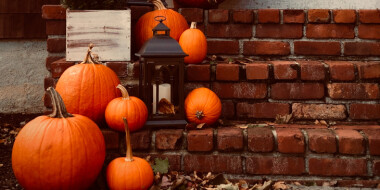
 Анна Михайлова-Левина
Анна Михайлова-Левина 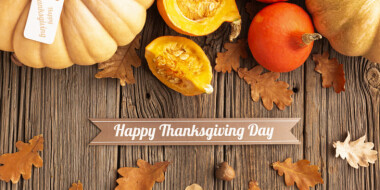
 Анна Гончар
Анна Гончар 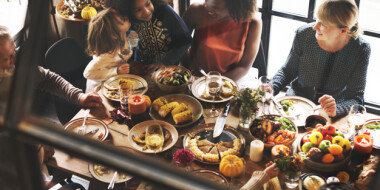
 Кристина Шабо
Кристина Шабо 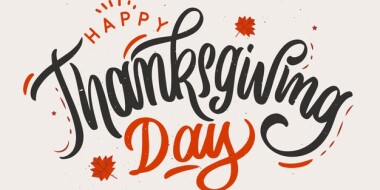
 Дарья Некрасова
Дарья Некрасова 